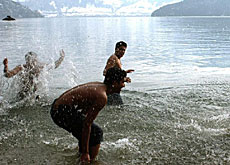Consumers develop taste for bottled water

Sales of mineral water are on the rise in Switzerland, as more and more consumers prefer its potential health-giving properties and purity.
But while local brands are doing well at home, they are struggling to gain a toehold on the thriving international market for bottled waters.
Switzerland is known for its abundance of water resources. Its rivers, lakes and mountain streams feature on practically every tourist brochure and contribute to the country’s image.
A wealth of statistics and analyses confirm that Swiss tap water, as well as being generally as safe and healthy as bottled water, is far cheaper and more environmentally friendly.
Nevertheless 30 per cent of Swiss prefer to drink bottled water and consumption has grown rapidly over the years.
In 1900 the Swiss drank just two litres per person per year. This increased to 69 litres in 1990 and climbed to 118 litres in 2004.
Reluctance
Nicolas Rouge, chief executive of Henniez, the leading Swiss bottled water company, believes the treatment process accounts for consumers’ growing reluctance to drink tap water.
“Tap water, unlike mineral water, is often filtered, sterilised or has had fluoride added to it,” he said.
The condition of many water pipes also leaves much to be desired. It is not uncommon for the authorities to issue warnings that water supplies are contaminated.
“Another problem that should not be underestimated is the increasing presence of hormones in drinking water – a problem for which no solution has yet been found,” said Pierre Schwaller, a Swiss food engineer.
Healthy living
Experts say another reason that people across the globe are increasingly turning to mineral water is the trend towards healthy living.
Switzerland, with its many sources of crystal-clear water, should therefore be able to claim a strong position on the bottled water market, both domestically and internationally.
But in fact very few Swiss companies who produce mineral water – with the exception of Swiss food multinational Nestlé – have managed to make an impact abroad.
One major Swiss mineral water company, Valser, has already been snapped up by United States soft drinks giant, Coca Cola. The move into mineral water by Coca Cola came after falling sales in the soft drinks market.
For many domestic mineral water companies the home market remains the most attractive. One case in point is Henniez, which has a 16.5-per-cent market share, but earns a mere one per cent of its income outside the country.
According to Rouge, this is a deliberate choice: the family-run firm prefers to remain faithful to its traditional Swiss clientele.
Fears
But Schwaller is more critical. “The Swiss do not export mineral water, because they don’t know how to,” he told swissinfo.
The giants of the food industry, such as French group Danone and Nestlé, dominate the international sector. This makes it difficult for local firms to compete on equal terms, says Schwaller.
“If they are to succeed in exporting, Swiss producers must be prepared to take greater risks,” he said. “They could for example sell new, specialised products on a larger scale and gain a niche market.”
But such innovations take time and require major investments to succeed – a risk which, according to Schwaller, few Swiss firms seem prepared to take.
swissinfo, Anna Passera
The recommended daily intake of water is approximately 2 litres.
100 years ago the average annual consumption of mineral water was 2 litres per person.
The average annual consumption of mineral water today is 118 litres per head.
In 2004 the Swiss consumed 877 million litres of mineral water.
Cost breakdown of a bottle of mineral water: production 50%, marketing 25%, personnel 15%, administration 10%.
Tap water is often filtered, sterilised or chlorinated.
Bottled mineral water, on the other hand, is often untreated and often does not contain additives.
The addition of carbon dioxide is allowed.
Treatment to remove traces, such as iron or sulphur, is permitted in certain circumstances.

In compliance with the JTI standards
More: SWI swissinfo.ch certified by the Journalism Trust Initiative









You can find an overview of ongoing debates with our journalists here . Please join us!
If you want to start a conversation about a topic raised in this article or want to report factual errors, email us at english@swissinfo.ch.